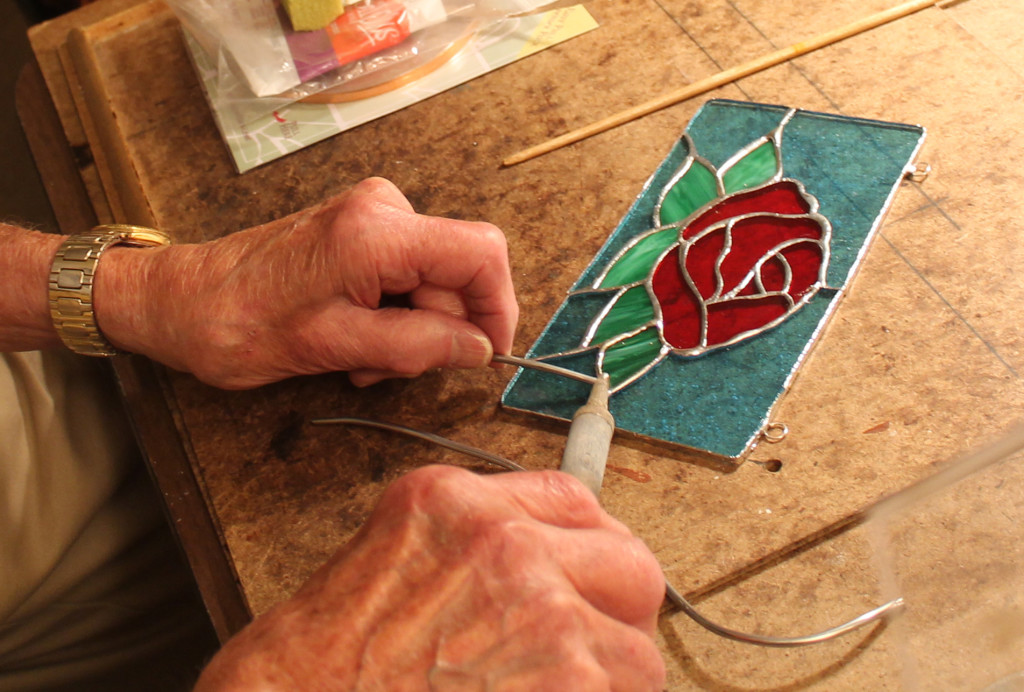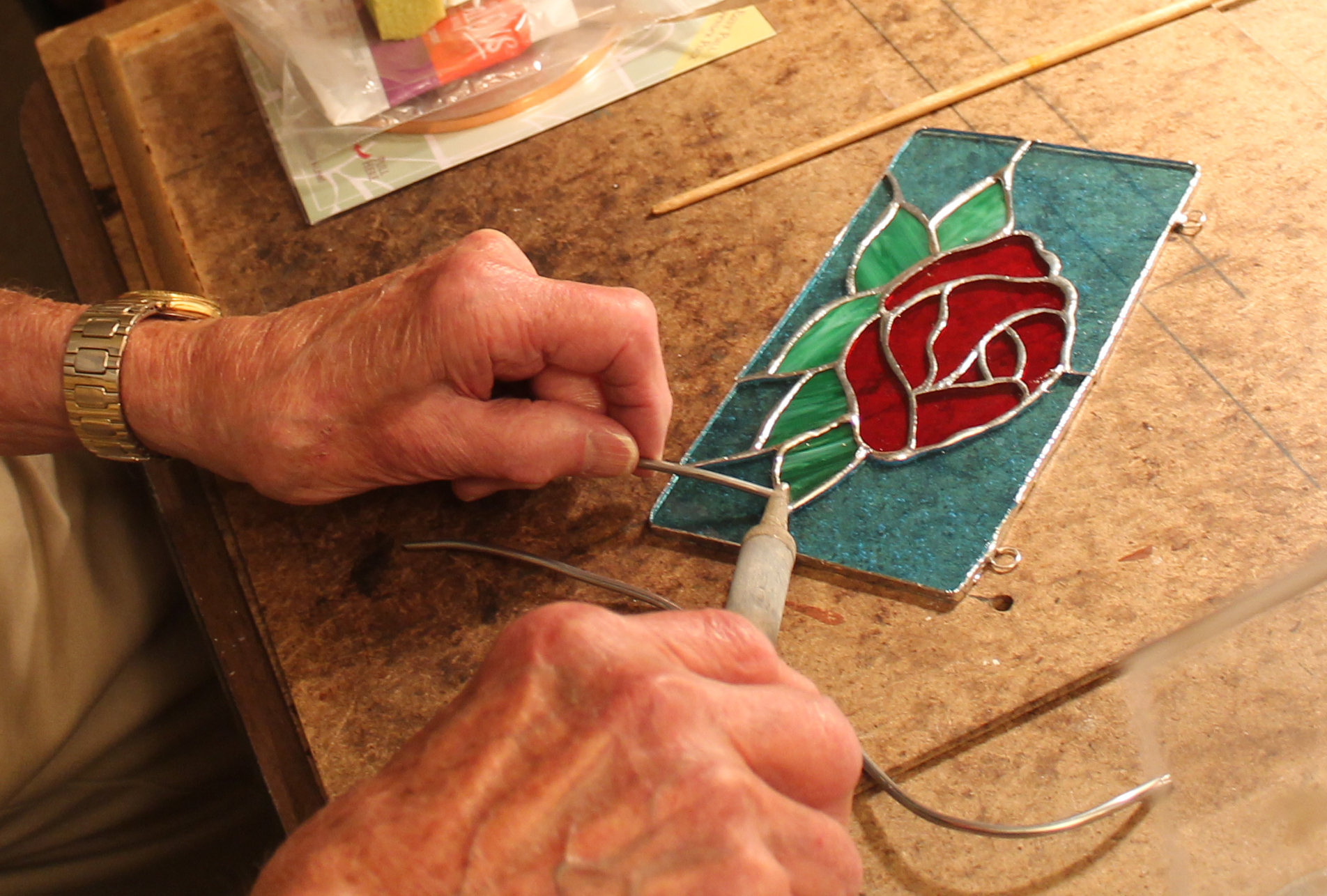
A stained-glass lesson with my buddy, Irv Rich. He’s helping me fix the solder on a piece I made for my Mom for Mother’s Day. Photo by Jackie Hobbins.
A few months ago, I sat next to Mr. Irving Rich at church. In his late-80’s, he was sitting by himself in the back row at church. I introduced myself and Irv and I have been buddies ever since. He is the kind of guy who you know he enjoys your company, but is cheeky enough to always be giving you a hard time. Shortly after we met, he asked me how old my boys were and said he had a night-light that he’d made out of stained glass and that he wanted to give them. He brought in the next week in a brown paper bag; he sort of threw it unceremoniously at me, saying, “This is for you.” It is a beautiful little rocking horse, and we use it every night in the boy’s room. When I mentioned to Irv that I’ve always wanted to learn how to make stained glass, he said he would be happy to teach me. I jumped at the opportunity.
We got together in Irv’s spare room, where he has a little workshop set up. He had a small hummingbird pattern picked out and we got to work right away. He encouraged me along the way, but not too much. Irv has taught before, so he knew it was important to keep me feeling positive, but also motivated to learn more. At the end, I was so thankful: here is someone I had just met, who was so willing to share his time with me, and share a lifetime of information with me about a craft he really cared about—from one craftsperson to another. When I told him how much his time meant to me, he said, “I really enjoy passing on my skills.” I really understood what he meant a few weeks later when I began passing on my own skills to a young grant writer.
Research shows that I am not alone in my experience. Indeed, there is a wealth of positive benefits to both giving your time to others and receiving that time from another. Here are the facts to back it up:
1. Giving makes people happy: A recent study (Aknin, 2013) showed that when folks give to something or someone they have a social connection with, it brings them measurably greater happiness then when they spend that same time or money on themselves.
2. Giving is good for your health: Giving to others lowers stress and boosts the immune system (Yoruk, 2014).
3. Giving promotes social connection and cooperation: What goes around comes around, people! Call it karma if you want, but science shows that positive social interactions with each other create social capital, the glue that keeps communities healthy (Putnam, 2000).
4. Giving creates gratitude and gratitude makes people happy: People who focus on being thankful report higher levels of alertness, enthusiasm, determination, attentiveness, and energy (Emmons & McCullough, 2003).
5. When you give your time, you get more time: Another recent study showed that people who give their time away by helping others have a higher sense of “time affluence” (Mogilner 2012). While you don’t get more then 24 hours in a day, but when you’ve helped someone you get a sense of accomplishment that makes you feel you have more time and as a result, less stress about being busy.
I suppose Irv must have figured this out long ago, since I am not his first student and he’s doing this well into his ninth decade. Certainly, Irv is passing on a lot more then just his stained-glass techniques.
“The best way to find yourself is to lose yourself in the service of others.”
P.S., Happy 88th birthday, Irv!!
Aknin, L. B., E. W. Dunn, G. M. Sandstrom, and M. I. Norton (2013), “Does social connection turn good deeds into good feelings? On the value of putting the ‘social’ in prosocial spending.” International Journal of Happiness and Development, 1(2): 155-171.
Yörük, B. K. (2014), “Does giving to charity lead to better health? Evidence from tax subsidies for charitable giving,” Journal of Economic Psychology, 45: 71–83.
Putnam, R. D.. (2000), Bowling Alone: The Collapse and Revival of American Community. Simon & Schuster, New York.
Emmons, R. A., and M. E. McCullough (2003), “Counting Blessings Versus Burdens: An Experimental Investigation of Gratitude and Subjective Well-Being in Daily Life.” Journal of Personality and Social Psychology, 84(2): 377–389.
Mogilner, C., Z. Chance, and M. I. Norton (2012), “Giving Time Gives You Time,” Social Psychological and Personality Science, 5: 475–483.


Comments
This is an awesome article about giving just a little of yourself to other people. Irv with his dry wit and warming smile sure gives a lot to all the communities that he is a part of. Whether it’s his time, his talents, or his 88 years of life lessons being poured out; you feel a lot lighter after a talk with Irv. Happy birthday buddy!
First, that is a beautiful piece you’re working on! Irv is obviously an excellent teacher and you a wonderful student. 🙂 And secondly, yes, there are so many benefits to giving! That’s how I felt when I was teaching and giving the “gift” of knowledge. To watch as faces light up when they grasped a new idea… it was like I was the Grinch when he heart grew three sizes. <3